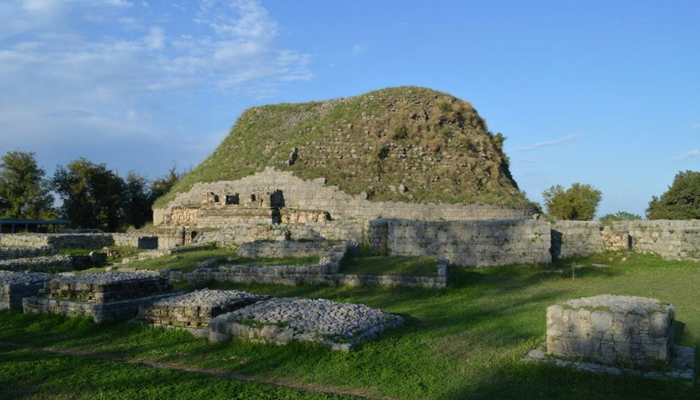Expert sheds light on Taxila’s rich cultural heritage
HARIPUR: Taxila stands as a testament to the rich cultural and educational heritage of the ancient world, with its well-preserved archaeological remains providing insights into the diverse civilization that once thrived in the region.
This was the gist of a public talk that Prof Rashid Khan, a known historian, delivered at the Lok Chaupal in the famous Panjkatha area of Khanpur on Monday. Members of intelligentsia, journalists, retired officers of different public sector organizations and development experts were in attendance. Ayaz Kiani moderated the session.
Speaking to the participants on the topic of the historical background of Taxila, Prof Rashid Khan said that Taxila - an ancient archaeological site in Pakistan - has evidence of human habitation dating back to the 2nd millennium BC and held an incredible historical and cultural importance for Pakistan.
Prof Rashid Khan explained how Taxila has been an important centre of the Gandhara region and connected with the ancient trade routes. He elaborated how Taxila through ages has been a melting pot of various cultures and attracted invaders, scholars, philosophers and traders from around the world.
“Taxila came under the influence of the Greco-Bactrian and Indo-Greek kingdoms after Alexander the Great’s conquests. The city continued to thrive as a centre of commerce, culture, and learning. Taxila flourished under the Kushan Empire with further contributions to art and learning. Buddhist art and architecture, including stupas and monasteries, were prominent during this period,” he quoted from his research and history books.
He said that the Gupta period saw the continued development of Taxila as a centre for Buddhism and Hinduism and many of the Buddhist stupas and monasteries were expanded and adorned with sculptures. However, he said that Taxila faced invasions by the White Huns, contributing to its decline. The city gradually lost its importance as a major centre and the once-great university fell into decline.
About its coming under Islamic rule, he said Taxila came under Islamic rule with the advent of the Arab invasions. The city continued to be of historical and religious significance, but its political and economic importance diminished but it gained attention from European archaeologists and historians during the British colonial period. Prof Rashid Khan explained that Taxila today was designated as a UNESCO’s World Heritage Site, acknowledging its archaeological and cultural importance.
-
 Prince William Warned His Future Reign Will Be Affected By Andrew Scandal
Prince William Warned His Future Reign Will Be Affected By Andrew Scandal -
 Amy Madigan Reflects On Husband Ed Harris' Support After Oscar Nomination
Amy Madigan Reflects On Husband Ed Harris' Support After Oscar Nomination -
 Is Studying Medicine Useless? Elon Musk’s Claim That AI Will Outperform Surgeons Sparks Debate
Is Studying Medicine Useless? Elon Musk’s Claim That AI Will Outperform Surgeons Sparks Debate -
 Margot Robbie Gushes Over 'Wuthering Heights' Director: 'I'd Follow Her Anywhere'
Margot Robbie Gushes Over 'Wuthering Heights' Director: 'I'd Follow Her Anywhere' -
 'The Muppet Show' Star Miss Piggy Gives Fans THIS Advice
'The Muppet Show' Star Miss Piggy Gives Fans THIS Advice -
 Sarah Ferguson Concerned For Princess Eugenie, Beatrice Amid Epstein Scandal
Sarah Ferguson Concerned For Princess Eugenie, Beatrice Amid Epstein Scandal -
 Uber Enters Seven New European Markets In Major Food-delivery Expansion
Uber Enters Seven New European Markets In Major Food-delivery Expansion -
 Hollywood Fights Back Against Super-realistic AI Video Tool
Hollywood Fights Back Against Super-realistic AI Video Tool -
 Pentagon Threatens To Cut Ties With Anthropic Over AI Safeguards Dispute
Pentagon Threatens To Cut Ties With Anthropic Over AI Safeguards Dispute -
 Meghan Markle's Father Shares Fresh Health Update
Meghan Markle's Father Shares Fresh Health Update -
 Samsung Galaxy Unpacked 2026: What To Expect On February 25
Samsung Galaxy Unpacked 2026: What To Expect On February 25 -
 Travis Kelce Takes Hilarious Jab At Taylor Swift In Valentine’s Day Post
Travis Kelce Takes Hilarious Jab At Taylor Swift In Valentine’s Day Post -
 NASA Confirms Arrival Of SpaceX Crew-12 Astronauts At The International Space Station
NASA Confirms Arrival Of SpaceX Crew-12 Astronauts At The International Space Station -
 Can AI Bully Humans? Bot Publicly Criticises Engineer After Code Rejection
Can AI Bully Humans? Bot Publicly Criticises Engineer After Code Rejection -
 Search For Savannah Guthrie’s Abducted Mom Enters Unthinkable Phase
Search For Savannah Guthrie’s Abducted Mom Enters Unthinkable Phase -
 Imagine Dragons Star, Dan Reynolds Recalls 'frustrating' Diagnosis
Imagine Dragons Star, Dan Reynolds Recalls 'frustrating' Diagnosis




